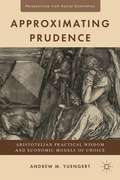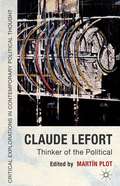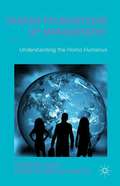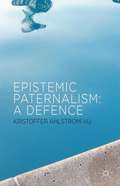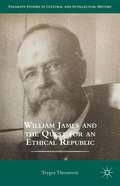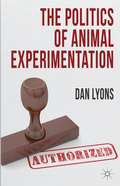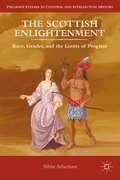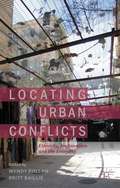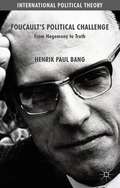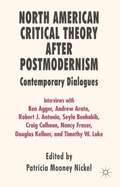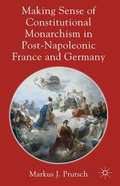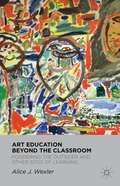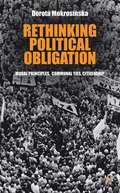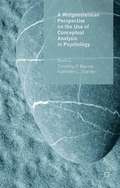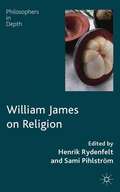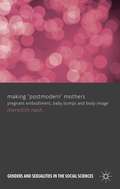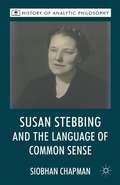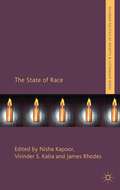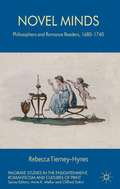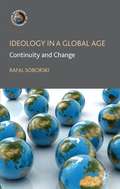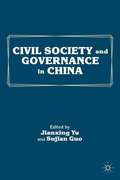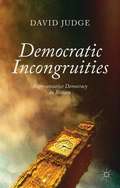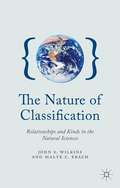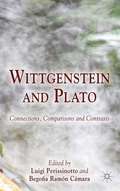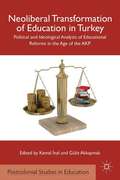- Table View
- List View
Approximating Prudence
by Andrew M. YuengertIn a unique undertaking, Andrew Yuengert explores and describes the limits to the economic model of the human being, providing an alternative account of human choice, to which economic models can be compared.
Claude Lefort: Thinker of the Political (Critical Explorations in Contemporary Political Thought)
by Martín PlotThis is the first English language volume to offer such a wide-ranging scholarly and intellectual perspective on Claude Lefort. It constitutes the most comprehensive attempt to reconstruct Lefort's engagement with his theoretical interlocutors as well as his influence on today's democratic thought and contemporary continental political philosophy.
Human Foundations of Management: Understanding the Homo Humanus
by Domènec Melè Cèsar González CantónHuman Foundations of Management explores the human foundation of management and economic activity in a way that is accessible to readers. The structure and contents of this book examines those aspects of the human being which are relevant to management and economic activities.
Epistemic Paternalism
by Kristoffer Ahlstrom-VijAny attempt to help us reason in more accurate ways faces a problem: While we acknowledge that others stand to benefit from intellectual advice, each and every one of us tends to consider ourselves an exception, on account of overconfidence. The solution? Accept a form of epistemic paternalism.
William James and the Quest for an Ethical Republic
by Trygve ThrontveitPragmatist philosopher William James has long been deemed a dubious guide to ethical reasoning. This book overturns such thinking, demonstrating the coherence of James's efforts to develop a flexible but rigorous framework for individuals and societies seeking freedom, meaning, and justice in a world of interdependence, uncertainty, and change.
The Politics Of Animal Experimentation
by Dan LyonsThe reality of animal experimentation and its regulation in Britain have been hidden behind a curtain of secrecy since its emergence as a political controversy in the 1870s. Public debate and political science alike have been severely hampered by a profound lack of reliable information about the practice. In this remarkable study, Dan Lyons advances and applies policy network analysis to investigate the evolution of British animal research policy-making.
The Scottish Enlightenment
by Silvia SebastianiExamines how the difference between monogenist and polygenist accounts of the origin of the human race was reflected in, and helped to shape, Scottish Enlightenment accounts of society's progress through historical stages. Reveals how concepts of race and the role of women were treated by historians, philosophers, and other thinkers.
Locating Urban Conflicts
by Wendy Pullan Britt BaillieCities have emerged as the epicentres for many of today's ethno-national and religious conflicts. This book brings together key themes that dominate our current attention including emerging areas of contestation in rapidly changing and modernising cities and the effects of extreme and/or enduring conflicts upon ordinary civilian life.
Foucault’s Political Challenge
by Henrik Paul BangTracing increasing distrust of politicians and democratic institutions back to the negative idea of political power and freedom as always being a 'power over' and 'freedom from', this text examines Foucault's alternative conception of the politician as one who has the courage to tell people the truth about what has to be done in the face of the dangers they confront. Telling the truth is not sufficient, but must be complemented with empowering people to actively help in overcoming the dangers themselves. Breaking with conceptions of politics as hierarchy and anarchy, Foucault contended that where there is obedience, there cannot be truth and genuine freedom. This book offers a redefinition of power and freedom within a circular logic of true authority and self-governance. It argues that democracy cannot survive without being innovated along these lines, and considers what can be done to reconnect politicians and laypeople in order to rebuild their mutual trust in each other's political capacities.
North American Critical Theory after Postmodernism
by Patricia Mooney NickelIn a series of interviews this book explores the formative experiences of a generation of critical theorists whose work originated in the midst of what has been called 'the postmodern turn,' including discussions of their views on the evolution of critical theory over the past 30 years and their assessment of contemporary politics.
Making Sense of Constitutional Monarchism in Post-Napoleonic France and Germany
by Markus J. PrutschThe collapse of the Napoleonic order in 1814 symbolised a victory over revolutionary principles, yet it was impossible to turn the clock back and negate the legacy of the Revolution and the Napoleonic age. Could monarchical claims for personal government be realistically reconciled with the legacy of the Revolution? This dilemma gave rise to the concept of a genuinely 'monarchical' form of political rule in Europe, which distinguished itself not only from absolutism and revolutionary constitutionalism, but also British parliamentarianism. Focusing on the genesis of 'constitutional monarchism' in the context of the French Restoration and its favourable reception in post-Napoleonic Germany, this study highlights the potential and limitations of the daring attempt to improve traditional forms of monarchical legitimacy by means of a modern representative constitution. With historical, legal and politico-theoretical aspects equally examined, this work contributes towards a clearer understanding both of the 19th century and European constitutionalism.
Art Education Beyond the Classroom
by Alice J. WexlerBy focusing on children and adults with disabilities, each contributor offers critical research which challenges the non-transferable divide between us and them , encouraging art teachers, therapists, critics, and general readers alike to uncover their biases regarding the nature of art and education.
Rethinking Political Obligation
by Dorota MokrosinskaWhat are the grounds for and limits to obedience to the state? This book offers a fresh analysis of the debate concerning the moral obligation to obey the state, develops a novel account of political obligation and provides the first detailed argument of how a theory of political obligation can apply to subjects of an unjust state.
A Wittgensteinian Perspective On The Use Of Conceptual Analysis In Psychology
by Kathleen L. Slaney Timothy P. RacineThis edited volume includes contributions from internationally renowned experts in the philosophy of Ludwig Wittgenstein. It applies his later philosophy to concrete issues pertaining to the integrity of scientific claims in a broad spectrum of research domains within contemporary psychology.
William James on Religion
by Henrik Rydenfelt Sami PihlströmA team of international experts present a collection of articles on William James's philosophy of religion and its current relevance. A new look at his philosophy of religion is crucially important for the development of this field of inquiry today.
Making ‘Postmodern’ Mothers
by Meredith NashBased on interviews with pregnant women, this book provides a multi-disciplinary empirical account of pregnant embodiment and how it relates to wider sociological and feminist discourses about gender, bodies, 'fitness', 'fat', celebrity and motherhood.
Susan Stebbing and the Language of Common Sense
by Siobhan ChapmanThis first book-length study of the work and life of L. Susan Stebbing relates the development ofher thought to the philosophical, social and political background of her life. It also assesses Stebbing's contribution in the light of developments both in analytic philosophy and in linguistics in the decade since her death. "
The State of Race
by Virinder S. Kalra Nisha Kapoor James RhodesThis book analyses the nature of the contemporary racial state, exploring issues such as the nature of postraciality, racial neoliberalism, the state of multiculturalism and whiteness, alongside the functioning of state institutions and policy concerning the military, education, community surveillance, asylum and extradition.
Novel Minds
by Rebecca Tierney-HynesEighteenth-century philosophy owes much to the early novel. Using the figure of the romance reader this book tells a new story of eighteenth-century reading. The impressionable mind and mutable identity of the romance reader haunt eighteenth-century definitions of the self, and the seductions of fiction insist on making an appearance in philosophy.
Ideology in a Global Age
by Rafal SoborskiThis book challenges the popular view that established ideologies no longer make sense in today's globalizing world. Considered from a broad historical perspective, major ideological traditions have not become destabilized and incoherent by globalization, but remain meaningful political beliefs that shape the globalization debate.
Civil Society And Governance In China
by Sujian Guo Jianxing YuWritten by scholars from both inside and outside China, this wide-ranging collection of essays explores the complexity of the relationship between governance and civil society by combining theoretical exploration and empirical case studies based on the governance practice in China.
Democratic Incongruities
by David JudgeClear disparities exist between notions of representative democracy and political practice in Britain. Alternative models of democracy, however, have their own incongruities in trying to marry representation and democracy. This book analyses the mismatches in democratic theories and between theory and practice in British representative democracy.
The Nature Of Classification
by Malte C. Ebach John S. WilkinsDiscussing the generally ignored issue of the classification of natural objects in the philosophy of science, this book focuses on knowledge and social relations, and offers a way to understand classification as a necessary aspect of doing science.
Wittgenstein and Plato: Connections, Comparisons And Contrasts
by Luigi Perissinotto Begoña Ramón CámaraWittgenstein was a faithful and passionate reader of Plato's Dialogues as confirmed by writings and witnesses. Here well-known scholars of Wittgenstein and Plato illuminate the relationship between the two philosophers both philologically and philosophically, and provide new interpretation keys of two of the leading figures of Western thought.
Neoliberal Transformation of Education in Turkey: Political and Ideological Analysis of Educational Reforms in the Age of the AKP (Palgrave Macmillan’s Postcolonial Studies in Education)
by Güliz Akkaymak Kemal İnalNeoliberal policies have had an impact on educational systems globally. This book provides a detailed and critical analysis of neoliberal educational policies and reforms in Turkey by focusing on the Justice and Development Party's reform efforts over the last eight years.
